By Adagbo ONOJA
It would not be pragmatic to call one person the star of the moment at a gathering of Socialists who resist deifying anyone. Otherwise, that is what Mallam Ibrahim Muazzam was at the recently concluded Marxism Conference at Nasarawa State University, Keffi. His stardom was not in what he said or how he said it but how he got what he had to say. Asked to link the Marxism Conference to the overarching theme, “Capitalism, Imperialism and Revolution”, he simply bent over backward to allow leading Nigerian leftists to speak. In the end, almost all of them – Amaechi Mbazulike, Osita Agwuna, Mokwugu Okoye, Eskor Toyo, S G Ikoku, Baba Omojola, Tunji Otegbeye, Bade Onimode, Omafume Onoge, Aaron Gana, Bala Usman, Claude Ake, Festus Iyayi – ended up addressing the audience. And it was like they all penned their lines only yesterday.

On the podium in Keffi
It could have been his own way of posing Understanding to Explanation, all as part of the Ibrahim Muazzam mystique. In a discipline such as Political Science which is fussy about method, he has managed to remain above the fray for over three decades. It is arguable but very few who studied Political Science in Bayero University, Kano at whatever level might be able to say that Muazzam is a Behaviouralist, a dialectician or a reflectivist. It is either he foresaw the current centrality of Eclectic Analyticism at least three decades before it happened or was simply clairvoyant. Whichever one it is, it makes him one of the most central figures in the production of political scientists in Nigeria in general and the Northwest in particular. What else might one say about someone who, for over three decades, taught the flagship modules of Contemporary Political Analysis at the graduate level and Classical/Contemporary Political Thought as well as Islamic Political Thought at the undergraduate level, thereby planting himself at the heart of Bayero University, Kano’s Political Science? For a university of BUK’s significance (and insignificance), this is something.
If Ahmadu Bello University, Zaria is where Marxism was taught, Bayero University in nearby Kano is where Marxism was acted out. The campus simply assumed the immense class contradictions of Kano, with every seminar, public lecture or symposium degenerating quickly into a representational warfare between the Talakawa as it were and the Sarauta. Apart from the contest for student union offices, the most memorable manifestation of such must be this particular altercation between two lecturers. One of the two was fond of arguing that Marxism is a foreign ideology until the second one asked him if Adams Smith came from Kumbutso Local Government Area of Kano State, that being where the first lecturer comes from. For a long time, there was silence from his end. Such instinctive, routine clashes was a campus wide thing as most students who won elections into the presidency of the student union government came from the Old Campus which, by the late 1980s, had become a campus exclusively for the Natural Sciences and Law following the movement of the university to its permanent site on Gwarzo Road.
But the radicalism the clashes epitomised was a puzzling transformation, BUK having started as an extraordinarily permissive university reflecting the Tombin Giwa conception of Kano: the belly of the elephant which could take any and everything without bursting. Then came a referendum which reversed this liberal atmosphere in favour of the ascendancy of those who had been arguing that a university located in Kano must have as its core the Islamic world outlook. Thereafter, the age of liberal permissiveness gave way to the age of radical take-over of BUK. Radical take-over in the sense that aside from the Muslim Students Society, (MSS) emerging as the strongest player as far as power and authority was concerned on the campus, the National Association of Nigerian Students, (NANS) also emerged or, rather, consolidated. And, between the two tendencies, it was a case of co-operation and conflict for a long time to come. Whenever it was an anti-imperialist outing, for instance, the two were together even as MSS activists would not openly come out to join such action initiated by the Marxist backed NANS. On many or every other issues, the relationship was conflictual.
 It is within such an institutional and social setting that a Muazzam was a one-man force for good. He rarely attended the numerous events students staged on the campus. That was not his forte. His forte was provoking students into journeys of rediscovery by throwing a puzzle on the ground at the start of nearly every lecture. He got many students hissing in disagreement in some cases, especially in Classical Political Thought or Islamic Political Thought, (any of the two can be offered by whoever wanted, something which many students did irrespective of their religious affiliation) but only for them to crave for more from him by the time he resolves the puzzle, mostly by contextualising the puzzle in The Holy Bible or The Holy Quran as the case may be or some classic by one philosopher or the other. So, his Socratic approach to knowledge transmission was one factor. The achievement here is that, in teaching political philosophy, he wasn’t a preacher but a scholar, the type this society is not getting today.
It is within such an institutional and social setting that a Muazzam was a one-man force for good. He rarely attended the numerous events students staged on the campus. That was not his forte. His forte was provoking students into journeys of rediscovery by throwing a puzzle on the ground at the start of nearly every lecture. He got many students hissing in disagreement in some cases, especially in Classical Political Thought or Islamic Political Thought, (any of the two can be offered by whoever wanted, something which many students did irrespective of their religious affiliation) but only for them to crave for more from him by the time he resolves the puzzle, mostly by contextualising the puzzle in The Holy Bible or The Holy Quran as the case may be or some classic by one philosopher or the other. So, his Socratic approach to knowledge transmission was one factor. The achievement here is that, in teaching political philosophy, he wasn’t a preacher but a scholar, the type this society is not getting today.
The second must be his epistemic coverage. On one’s way to becoming an undergraduate at BUK, a former academic of the university took one through an audit of the academics of the Department of Political Science. When he came to Muazzam, he opted to echo what Muazzam’s late HOD, Dr. Mark Igboeli had said about him. One day in the 1980s, Muazzam had taken Dr Igboeli to his study. Dr Igboeli came out saying, among other things, that “Muazzam reads crazily”. This former BUK lecturer told one that, among what Igboeli saw were Muazzam having read all the ten or so volumes of Ibn Khaldun’s The Muqaddimah. Not only had he read them, he also made side notes as he went along. It was not just The Muqaddimah but other major philosophers.
This was why Mallam Ibrahim Muazzam was among the four lecturers one set out to establish what they were to teach upon arrival on campus for the First year in the 1991/2 academic session . The first tragedy was that none of them was teaching First year students in the session. The saving grace was living with Mallam Y. Z. Y’au who was still a BUK academic and which meant that although one had a whole year to wait to encounter the Muazzams, MMYs, Yakubu Adams, etc, one was no longer outside the BUK intellectual cum ideological hub. Attahiru Jega does not appear on the list for a reason that is now funny.
As a diploma student in BUK, one had approached Jega for advice but actually for support in one’s project of avoiding a First Degree programme, a project which had become a war between one and some comrades who couldn’t understand why someone who was like them in many things would, however, not want to pursue a university degree. Jega was asked to see the point why I needed to take a particular postgraduate diploma instead of four years doing a degree during which one’s responsibilities would suffer. To one’s disappointment at that time, Jega said the programme in question was not meant for one but for people who had spent time on the job and needed such a certificate to move up a bit before retiring. That, he said, is why the entry qualification is such that I could think of it. For him, one was too young to even think of that. Instead of support for evading a First Degree, he reinforced the argument of those already at war on the issue without knowing so. Jega had, by implication, joined the ‘conspiracy’ led by Comrade John Odah, to force me to go to the university. In doing it eventually, I was going to avoid him as much as I could. If he were to read this, I am sure he would demand that one thanks him properly for his advice.
There is a third reason for Muazzam’s place in history. By the time one was a Third year student at BUK, things had worked out in such a way that students sought to and did determine what must be taught and in some cases, who must teach such courses. A set of ideologically involved students had emerged capable of piling sufficient pressure for certain courses to be on offer and they exercised this influence through a number of lecturers in the Department. Muazzam was one of the three lecturers who made this to happen and it was a big break for someone like this reporter who had turned down invitation to study Mass Communications further in pursuit of the Marxist vogue to Political Science. That explained the pressure. It turned out a fiasco as, for some reasons, Marxism was eventually not taught in the 1994/95 academic session even though it had reappeared on the teaching programme in the Department. It was major crash which only the diffuseness of the university could save. For Marxism did come but from the least likely source: Professor Musa Abdullahi’s fourth year course unit in Sociology into which one gyrated for no clear reasons – Sociology of Organisation.
 If Dr Dipo Fashina, formerly of the Obafemi Awolowo University is rated at his back as the best teacher the Nigerian university system has produced, then Professor Musa Abdullahi must be the duplicate. Prof Abdullahi who eventually became BUK’s Vice-Chancellor and rightly too taught Max Weber as if the two of them were playmates while growing up. Max Weber is the canonical voice in the study of bureaucracy. But to teach Weber, you have to teach Karl Marx because one was responding to the other. That’s how a staunch conservative who was very conscious of having trained in Sociology at the University of Chicago became the most systematic source of one’s academic Marxism. If that’s how all conservatives are, then they must be good teachers of Marxism. They know the ‘subversive’ elements of radical thoughts and how the establishment can avoid what David Easton calls ‘system overload’. Musa Abdullahi was an interesting lot.
If Dr Dipo Fashina, formerly of the Obafemi Awolowo University is rated at his back as the best teacher the Nigerian university system has produced, then Professor Musa Abdullahi must be the duplicate. Prof Abdullahi who eventually became BUK’s Vice-Chancellor and rightly too taught Max Weber as if the two of them were playmates while growing up. Max Weber is the canonical voice in the study of bureaucracy. But to teach Weber, you have to teach Karl Marx because one was responding to the other. That’s how a staunch conservative who was very conscious of having trained in Sociology at the University of Chicago became the most systematic source of one’s academic Marxism. If that’s how all conservatives are, then they must be good teachers of Marxism. They know the ‘subversive’ elements of radical thoughts and how the establishment can avoid what David Easton calls ‘system overload’. Musa Abdullahi was an interesting lot.
There are many things to write about an Ibrahim Muazzam. Of course, like most academics in BUK Political Science, he made his own contributions to the ‘governance revolution’ that was unfolding in Jigawa from May 29th, 2007 before the ‘revolution’ started consuming its own. He delivered a paper on identity to staff of the Media Department of Government House, Dutse that should be excavated and published now to cure the embarrassingly woolly Marxist analysis of ethnicity and hybridity some people parade in the name of radicalism. Recently, one came across one’s notes from his really fascinating exposition on the ‘critical turn’ when the then newly established Centre for Research and Documentation, (CRD) came up with a graduate level Methodology Workshop for some 40 or so laureates. In 2013, one found Muazzam following one to Warwick University in the UK whose MA International Security programme assumed everyone in it had got a certain level of previous training in Strategic Studies. A philosophical idea about Clausewitz one could still recollect from Muazzam’s class in the Fourth year course he taught provided a good entry point.
Weekly Trust was a few months old when it penetrated the late Mallam Aminu Kano’s diary. It was only Professor Ahmadu Jalingo who could make that to happen, being the keeper of the diary but it was Muazzam who enforced the limits Jalingo placed and guided one through the innermost thoughts of the late sage. Of course, he had read through them all. It was a very sensitive assignment because it is not clear if any Nigerian newspaper has penetrated the Sardauna, Chief Awolowo or Dr Nnamdi Azikiwe’s diary. Barring the off-limit pages, the reporter was allowed to photocopy pages which were reproduced in the cover story Weekly Trust eventually ran.
Age and time are taking their toll on Mallam just like every one of us. He is still strong, still capable of standing and delivering a long Key Note address while also retaining the wisecracks that mark him out. For instance, as attendees queued for lunch at the Marxism Conference in Keffi last week, he fired a shot at Dr Yima Sen by declaring that there was no food, only rice. He was dramatising the privileging of pounded yam at the expense of items such as rice in the Benue culinary imaginary.
As things are now, Mallam Muazzam appears to have just one major assignment left: ensure the presence of as many former students as possible when BUK awards him professorship in the very near future. The same thing that one thinks would happen to Mu’azu Mohammed Yusif, (aka MMY) of the same Department. The academic world cannot wait for that to happen.





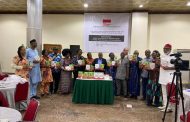


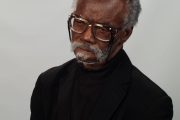

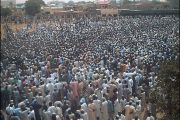



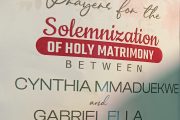

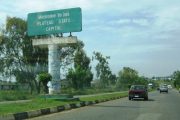












4 Comments
Lawal Shehu
This is true, I used to say ‘there are only two malams in BUK, Muazzam and others’cos I know what it is to be taught by him. I salute him and MMYUSUF
Lawal Shehu
It is him that encourages students on everything positive to either life, study and even business, he is good in motivation and impacting knowledge, he teach through a systematic approach by keeping students in wonder and questions, I was apportioned and blessed to have Malam in my study line
Muhammad Sanusi Umar
Muazzam’s curved his in not only Political science department but in and about knowledge being pursued by students and teachers in and out of the university. He has trained and produced giants in their rythms of Understanding Knowledge and how to get it. This article did not mention the IBK’s and Danju’s grooming perspectives; the results of J&D versus IBK two sessions. The epitome of the thrust in Knowledge thirst which Muazzam moderated.
Muhammad Sanusi Umar
Idris Alhassan Dan Hassan
Ibrahim Muazzam is my mentor, Teacher and the one who introduced me to political Philosophy during my Undergraduate study in the Department of political science BUK. I am still in a good contact with eminent Scholar and he teaching is beyond some things that one can narrate but only experiences can tell. Mu’azzam is a good Teacher and his knowledge is more like a Polymath of this era in political Philosophy. He is not a man of Certificates but Knowledge. Mu’azzam was born to study not study to lives.